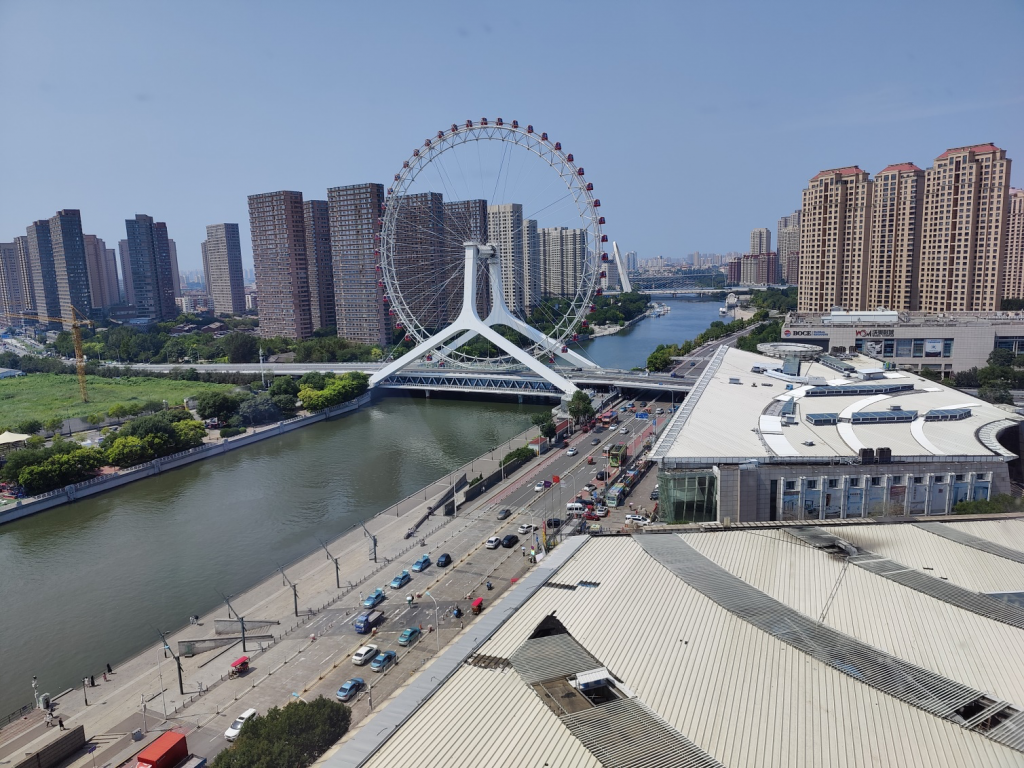By Staff writer
Published: February 21,2025

China’s Tianjin City and Tianjin Eye on Haihe River. Photo courtesy: @Gerald Mbanda
Smart cities are urban areas that use various types of electronic data collection sensors to manage assets and resources efficiently. They integrate information and communication technology (ICT) to enhance the quality of life for residents. The smart city concept is vital for Africa’s future, where rapid urbanization, infrastructure deficits, and growing populations are creating pressure on existing resources. China has been at the forefront of smart city development, with numerous projects demonstrating how technology can solve urban challenges. By examining China’s approach, African countries can glean valuable lessons to build smart cities tailored to their unique needs and circumstances.
China’s smart city initiatives prioritize integrating technology into every facet of urban life, from transportation to waste management. In cities like Shenzhen and Hangzhou, technologies such as Internet of Things (IoT), Artificial Intelligence (AI), and big data are used to monitor traffic, manage energy usage, and even predict public health trends. African countries can draw inspiration from China’s focus on technology-driven sustainability, implementing solutions that reduce carbon footprints and optimize energy consumption.
As the global population continues to rise, cities are growing at an unprecedented rate, and with this urban expansion comes a host of challenges. For many African countries, the opportunity to harness technological innovations and build sustainable, efficient, and livable urban spaces is both a necessity and an aspiration. One successful model that many African nations can learn from is China, which has made impressive strides in building smart cities.
For example, cities in Africa can utilize smart grids and energy-efficient buildings, similar to China’s extensive use of renewable energy sources like solar panels in urban infrastructure. China’s use of electric buses and smart traffic systems also highlights the potential for African cities to reduce pollution and ease congestion while promoting clean and efficient public transport.
Africa’s urban centers often face the challenge of inadequate infrastructure, including unreliable transportation systems, water shortages, and inefficient waste management. China’s experience offers a valuable reference point for how these challenges can be addressed with smart city solutions.
Chinese cities like Beijing have integrated IoT sensors into water systems to monitor usage and detect leaks, which not only ensures the efficient use of water but also cuts down on waste. For Africa, implementing such systems can drastically improve water conservation, especially in countries where water scarcity is a growing concern.
Additionally, China has pioneered the use of smart transportation infrastructure. African cities can learn from China’s development of underground metro systems and automated railways. These systems not only reduce traffic congestion but also cut down on the environmental impact of transportation, which is critical as many African cities continue to expand.
One of the critical success factors behind China’s smart city projects is the involvement of both the public and private sectors. China has forged strong partnerships with technology companies, such as Huawei and Alibaba, to provide the technological backbone for its smart cities. These collaborations ensure that the cities benefit from cutting-edge technologies while easing the financial burden on local governments.
African governments can adopt a similar approach by fostering partnerships with global tech giants, local businesses, and international investors. These collaborations can support smart city initiatives, such as developing affordable housing, creating efficient public transport systems, and building smart healthcare networks. Involving the private sector in infrastructure development and city planning also promotes innovation and reduces the strain on public finances.
China’s approach to smart cities is not only about technology but also focuses on inclusivity. In many Chinese cities, there is a strong emphasis on integrating underdeveloped areas into the smart city framework, ensuring that growth benefits all residents, not just the affluent.
African nations can apply this principle by ensuring that their smart cities cater to the diverse needs of their populations. By prioritizing affordable housing, accessible healthcare, and education, African governments can ensure that smart cities promote economic equality and provide opportunities for all citizens. Using data analytics to monitor socioeconomic conditions can help governments tailor their policies to reduce poverty and improve living standards for the most vulnerable.
China has leveraged smart cities to drive a digital economy, encouraging entrepreneurship, innovation, and the creation of tech startups. The success of cities like Shenzhen, often referred to as China’s Silicon Valley, demonstrates the importance of a thriving digital ecosystem in smart city development.
African countries can encourage the growth of their own digital economies by supporting innovation hubs, technology parks, and start-up incubators. The development of a digital infrastructure that supports fintech, e-commerce, and online services can drive economic growth and create job opportunities, particularly for the continent’s youthful population.
As African countries face the challenges of rapid urbanization, inefficient infrastructure, and environmental sustainability, they have a unique opportunity to learn from China’s successful smart city model. By focusing on technology-driven solutions, building resilient infrastructure, fostering public-private partnerships, prioritizing inclusivity, and promoting a digital economy, African nations can create smart cities that are not only technologically advanced but also sustainable, equitable, and future-ready. With the right planning, investment, and collaboration, Africa can build smart cities that serve as models of innovation and prosperity for the world.
 Africa -China Review Africa -China Cooperation and Transformation
Africa -China Review Africa -China Cooperation and Transformation
